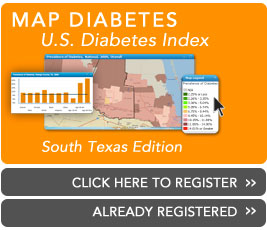Posted by Diabetes Rio Grande
Minority Diabetes Reports
Friday, February 5th, 2016

J Clin Endocrinol Metab, 6 January 2016
Context:
A higher prevalence of diabetes-related complications is reported in minority populations; however, it is not known if there are racial disparities in diabetes care and outcomes in hospitalized patients.
Objective:
To determine the association between hyperglycemia, in patients with and without DM (non-DM), and complications among different racial groups. …
Conclusions:
Black patients have higher rates of hyperglycemia and diabetes, worse inpatient glycemic control, and greater frequency of hospital complications compared to Whites. Non-DM Blacks with hyperglycemia are a particularly vulnerable group. Further investigation is needed to better understand factors contributing the racial disparities in the hospital. Read more.
Posted by Diabetes Rio Grande
Minority Diabetes Reports
Friday, February 5th, 2016
Diabetes Care, 30 December 2015
OBJECTIVE Cross-sectional studies suggest that lipopolysaccharide-binding protein (LBP) may be associated with obesity and metabolic disorders. However, prospective studies examining LBP are lacking. This prospective study investigated the association between LBP and metabolic abnormalities in 580 African ancestry men (mean age, 59.1 ± 10.5 years). …
CONCLUSIONS LBP may be a marker of prediabetes. Some of this association appears to be mediated through increased central and ectopic skeletal muscle adiposity. Read more.
Posted by Diabetes Rio Grande
Minority Diabetes Reports
Friday, February 5th, 2016
MMWR Morb Mortal Wkly Rep, 20 November 2015
Asians and Native Hawaiians or other Pacific Islanders (NHPIs) are fast-growing U.S. minority populations at high risk for type 2 diabetes. Although national studies have described diabetes prevalence, incidence, and risk factors among Asians and NHPIs compared with non-Hispanic whites, little is known about state-level diabetes prevalence among these two racial groups, or about how they differ from one another with respect to diabetes risk factors. To examine state-level prevalence of self-reported, physician-diagnosed (diagnosed) diabetes and risk factors among Asians and NHPIs aged ≥18 years, CDC analyzed data from the 2011–2014 Behavioral Risk Factor Surveillance System (BRFSS). Read more.
Posted by Diabetes Rio Grande
Minority Diabetes Reports
Friday, February 5th, 2016
ValleyCentral.com, 5 October$#160;2015
With nearly 30 percent of Rio Grande Valley residents with diabetes, the City of Harlingen has voted to create a new committee in an effort to spearhead wellness initiatives. Read more.
Posted by Diabetes Rio Grande
Minority Diabetes Reports
Friday, February 5th, 2016
Diabetes Care, July�2015
OBJECTIVE To assess the prevalence of diabetes and prediabetes and the associated risk factors in two Asian Indian populations living in different environments.
RESEARCH DESIGN AND METHODS We performed cross-sectional analyses, using representative samples of 2,305 Asian Indians aged 40–84 years living in Chennai, India, from the Centre for cArdiometabolic Risk Reduction in South-Asia study (CARRS) (2010–2011), and 757 Asian Indians aged 40–84 years living in the greater San Francisco and Chicago areas from the U.S. Mediators of Atherosclerosis in South Asians Living in America (MASALA) study (2010–2013). …
CONCLUSIONS These findings indicate possible changes in the relationship between migration and diabetes risk and highlight the growing burden of disease in urban India. Additionally, these results call for longitudinal studies to better identify the gene-environment-lifestyle exposures that underlie the elevated risk for type 2 diabetes development in Asian Indians. Read more.
Posted by Diabetes Rio Grande
Minority Diabetes Reports
Friday, February 5th, 2016
Urban Indian Health Institute, March 2015
Diabetes Mellitus is a major public health problem among American Indians and Alaska Natives (AI/ANs), and the prevalence of diabetes among AI/AN adults is twice that of non-Hispanic white adults. In an effort to reduce the burden of diabetes among AI/ANs, Congress established the Special Diabetes Program for Indians (SDPI) in 1997. The SDPI provides funding specifically to aid in the prevention and treatment of diabetes in AI/AN communities. SDPI includes the Community-Directed Diabetes Programs (tribal, IHS, and urban) and Initiatives (previously Demonstration Projects; now called the Diabetes Prevention and Healthy Heart Initiatives). This report focuses on the Community-Directed diabetes programs. Read more.
Posted by Diabetes Rio Grande
Minority Diabetes Reports, News
Thursday, August 20th, 2015

Cuida Tu Don de la Salud es una iniciativa pensada en ti para que puedas acceder a la última información y a otros recursos para el manejo de tu diabetes tipo 2. Ha sido desarrollada por Boehringer Ingelheim Pharmaceuticals, Inc., una de las compañías líderes en la investigación y desarrollo de medicamentos para el tratamiento de enfermedades crónicas como la diabetes tipo 2.





























